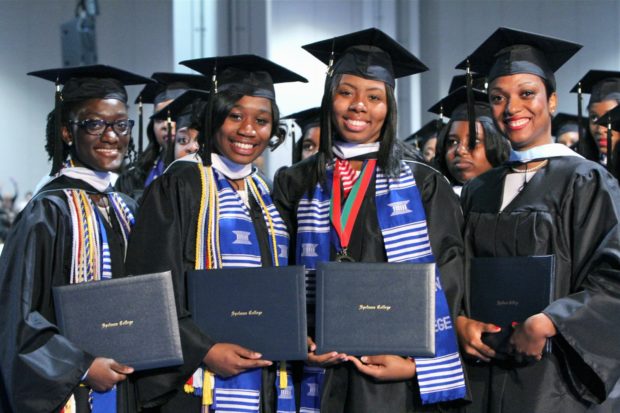Economics
Attending College Doesn’t Close Racial Wage Gap, Says New Report

By Kirsten West Savali, The Root
Since the first iteration of slavery transformed into its more contemporary forms—Jim Crow, mass incarceration, redlining, employment and education discrimination—the toxic myth that Black people can bootstrap their way to success and safety in a country that thrives on their subjugation has continued to thrive.
In a new report, “Asset Value of Whiteness,” Demos and the Institute on Assets and Social Policy take a deep dive into the intrinsic link between racism and capitalism; specifically, how whiteness infests the so-called American dream and renders it inaccessible to anyone who doesn’t meet the pre-selected criteria.
This is a truth that Black and brown people in this country have always known, but one that white people invested in the maintenance of white supremacy have willfully chosen to ignore.
“For centuries, white households enjoyed wealth-building opportunities that were systematically denied to people of color. Today our policies continue to impede efforts by African-American and Latino households to obtain equal access to economic security,” explains Amy Traub, associate director of policy and research at Demos and co-author of the report.
“When research shows that racial privilege now outweighs a fundamental key to economic mobility, like higher education, we must demand our policymakers acknowledge this problem and create policies that address structural inequity,” Traub continues.
A few key points from the “Asset Value of Whiteness”:
Attending college does not close the racial wealth gap. The median white adult who attended college has 7.2 times more wealth than the median Black adult who attended college and 3.9 times more wealth than the median Latino adult who attended college.
Raising kids in a two-parent household does not close the racial wealth gap. The median white single parent has 2.2 times more wealth than the median Black two-parent household and 1.9 times more wealth than the median Latino two-parent household.
Working full time does not close the racial wealth gap. The median white household that includes a full-time worker has 7.6 times more wealth than the median Black household with a full-time worker. The median white household that includes a full-time worker also has 5.4 times more wealth than the median Latino household with a full-time worker.
Spending less does not close the racial wealth gap. The average white household spends 1.3 times more than the average Black household of the same income group.
According to the report, “On average, white households spent $13,700 per quarter, compared to $8,400 for Black households.”
“Equal achievements in key economic indicators, such as employment and education, do not lead to equal levels of wealth and financial security for households of color,” notes Thomas Shapiro, director of the Institute on Assets and Social Policy.
“White households have a leg up, while households of color face systematic barriers to growing wealth, reproducing our long-standing racial wealth gap over generations,” Shapiro continues.
“Without policies that combat ingrained wealth inequalities, the racial wealth gap that we see today will continue to persist.”
Activism
Oakland Post: Week of November 26 – December 2, 2025
The printed Weekly Edition of the Oakland Post: Week of November 26 – December 2, 2025

To enlarge your view of this issue, use the slider, magnifying glass icon or full page icon in the lower right corner of the browser window.
Activism
Oakland Post: Week of November 19 – 25, 2025
The printed Weekly Edition of the Oakland Post: Week of November 19 – 25, 2025

To enlarge your view of this issue, use the slider, magnifying glass icon or full page icon in the lower right corner of the browser window.
Activism
Oakland Post: Week of November 12 – 18, 2025
The printed Weekly Edition of the Oakland Post: Week of November 12 – 18, 2025

To enlarge your view of this issue, use the slider, magnifying glass icon or full page icon in the lower right corner of the browser window.
-

 Activism4 weeks ago
Activism4 weeks agoOakland Post: Week of November 12 – 18, 2025
-

 Activism3 weeks ago
Activism3 weeks agoIN MEMORIAM: William ‘Bill’ Patterson, 94
-

 Activism4 weeks ago
Activism4 weeks agoHow Charles R. Drew University Navigated More Than $20 Million in Fed Cuts – Still Prioritizing Students and Community Health
-

 Bay Area4 weeks ago
Bay Area4 weeks agoNo Justice in the Justice System
-

 #NNPA BlackPress3 weeks ago
#NNPA BlackPress3 weeks agoLewis Hamilton set to start LAST in Saturday Night’s Las Vegas Grand Prix
-

 #NNPA BlackPress3 weeks ago
#NNPA BlackPress3 weeks agoBeyoncé and Jay-Z make rare public appearance with Lewis Hamilton at Las Vegas Grand Prix
-

 Activism3 weeks ago
Activism3 weeks agoOakland Post: Week of November 19 – 25, 2025
-

 #NNPA BlackPress4 weeks ago
#NNPA BlackPress4 weeks agoThe Perfumed Hand of Hypocrisy: Trump Hosted Former Terror Suspect While America Condemns a Muslim Mayor



















































